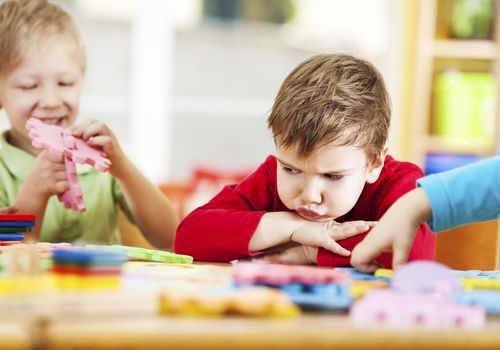One of the hardest things to deal with as a parent may be having to make the apology rounds to your child’s classmates, parents, and teachers after a biting incident. After all, no one enjoys having to endure the disapproving looks from other adults or having to speak with your own child on the car ride home about the consequences of biting/hurting others. So why does my child bite their friends? How can I stop it before teeth marks show up on all of my child’s classmates?
Frustrated or Excited? Biting friends is more common that you think. A lot of toddlers have difficulty expressing themselves or expressing their emotions in a healthy way. Many times, toddler biting incidents involve three main emotions: anger, frustration, and excitement. Determining which one is the most frequent cause can help narrow down how to prevent the behavior in the future.
- Frustrated: Having a friend take your toy, losing your preferred carpet square, not being understood, or not getting to go on the slide can be really maddening for a toddler. Sometimes, they deal with the anger and frustration by biting peers or adults surrounding the incident. Additionally, sometimes toddlers use biting as a way of making themselves and their boundaries understood when language is not a reliable option.
- Helping the Frustrated Biter: Identifying and helping the frustrated biter be more easily understood is the best method of prevention. This could include modeling the language, providing alternative solutions (like asking a teacher for help), or reaching out to a speech therapist for assistance in developing expressive communication.
- Excitement: Have you ever seen a child jump up and down uncontrollably when they learn of the upcoming Disneyland vacation? Or run around the house without “settling” when they hear a favorite relative is coming to visit? These kinds of movements and reactions help with self-regulation. Oftentimes, when a child bites themselves or others when excited, it is a method of helping regulate those feelings.
- Helping the Excited Biter: The best way to prevent the excited biter from, well, biting, is to provide a substitute activity. Whether it is pushing a laundry basket full of clothes, climbing stairs, completing wall pushups, or jumping on a trampoline any kind of heavy work can substitute for biting. If your little one demands an oral motor method of heavy work, chewing a crunchy snack or sucking a thick liquid like yogurt or applesauce through a straw can be beneficial.
If self-regulation or expressive communication seem to be an issue for your child, please contact Valued Voices for a screening and additional resources.

Kaelyn Green, MA, OTR/L
Kaelyn Green is a licensed occupational therapist at Valued Voices. She is certified by the University of Southern California in Sensory Integration and is an advocate for addressing underlying sensory functioning in order to improve occupational performance. She is passionate about meeting children and families where they are at and seeks to tailor interventions to the unique needs of her clients. When she is not working, you will find Kaelyn taking care of her two goldendoodles, working in her garden, or taking trips to the Central Coast.

